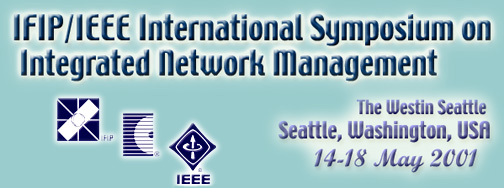|
|

KEYNOTE
SPEAKERS
|

|
Roberto
Saracco
Director-Marketing and Communications, Telecom Italia, Italy
|
|
The
Future of Communications:
Managing What? Managing How?
Abstract: We used to live
in a technology-driven evolution. In that framework, we invented
the OSI model and the TMN architecture, we dreamed of a unified
network, the ISDN, and we pursued the dream of broadband for
everyone, anywhere.
In the last decade more and more people have started to talk
about a shift from technology push to market pull. However,
in the next few years we are going to see a mutual interplay
of these two evolutionary forces, thus creating a tremendous
variety of solutions, architectures, paradigms.
The dream of a unification, call it ISDN, broadband or UMTS
is over. Physicists and engineers working on unifying architectures
are being overrun by physicists and engineers creating new
approaches that apply mixes of old and new technologies.
And along with the dream of unification goes the dream of
a unified management architecture, of seamless end-to-end
service management and of standardised management interfaces.
Unheard of questions like "Managing What?" are starting to
surface. And the question "Managing How?" is drawing new answers.
This talk is intended to intensely challenge the audience,
casting strong doubts and stimulating divergent thinking.
Bio: Roberto Saracco graduated
in Computer Science has a University degree in Mathematics
and a doctorate in Elementary Particles Physics. He was involved
in Software Design for the first Italian SPC systems in the
70ies. Since the middle of the 80ies he led research activities
in Telecommunications Management in CSELT, the research centre
of the Telecom Italia Group.
He has been directly or indirectly participating in a number
of international standardisation organisations including CCITT,
OSI, ETSI and T1M1. He chaired the group at EU level for planning
European research activities in the area of software technologies
and the EURESCOM group designing the framework for European
co-operation on TMN. He has led the EURESCOM group on Information
modelling for Pan European Services and Network Management.
He served as member of the Advisory Board of the Journal on
Network and Systems Management, and chaired the Committee
on Network Operations & Management in 1994-1996 and the
Committee on Enterprise Networking in 1996-1998 of the IEEE
Communications Society. Since 2000 he is Director of Marketing
for COMSOC and Member of the Board.
In 1996-97 he chaired the Visionary Group on Super Intelligent
Networks to steer the cooperative research at EU level beyond
year 2000 and contributed to outline scenarios of telecommunications
in the year 2010 within the cooperative European framework
of AmI (Ambient Intelligence).
In 1999 and 2000 he proposed and carried out a World Bank
project in the InfoDev framework to foster entrepreneurship
in Latin America countries.
Since 1994 he is head of the Marketing & Communications
area in CSELT. He has published over 100 papers in Journals
and Magazines, four books –the latest "The disappearance of
Telecommunications" is published in the USA by IEEE- and several
articles in the scientific section of daily newspapers. He
has been giving speeches and keynotes at many international
conferences. At several stages in his career he taught at
Universities in Italy and abroad on the subject of Telecommunications,
Innovation and Network Economy.
|
|

|
Ira
Machefsky
General Partner of Odeon Capital Partners, USA
|
|
A
Brief History of Venture Capital in Internet Time:
The Recent Past, Present and Near Future
of High Tech Venture Capital
Abstract:
Private equity markets have just gone through an extraordinary
period when anything seemed possible, and money was available
for almost every idea. In the current straightened circumstances,
no idea seems good enough to fund, and some VCs are even declining
offers of capital to invest. Where will this lead the venture
industry, and what will it mean to you as you try to raise
new rounds of capital for your existing companies or get new
companies off the ground? When public markets get burned by
acting like venture investors, throwing money at companies
with little revenue, no profits, and questionable business
models, it won't be long before private markets act like public
investors, insisting on profitability and "traction" even
in early stage start-ups. The upshot could well be a period
of venture drought that strangles promising start-ups before
they have time to mature.
Bio: Ira Machefsky, General
Partner of Odeon Capital Partners. Prior to joining Odeon,
Ira was Vice President and Senior Analyst at Giga Information
Group where he covered the Internet, electronic commerce and
security technologies markets. Ira is a frequent speaker at
conferences, commentator in the media as well as a published
researcher. Ira worked at Digital Equipment Corporation from1978
to 1996, where he served in a number of capacities. The most
interesting and important of these was a period of more than
a decade, beginning in 1984, managing Digital's West Coast
University Research Program. In this research program, Ira
was responsible for managing the investment of over $50 million
in many university projects in the areas of chip design, storage
systems architecture, computer architecture, databases, high-speed
networks and communications systems. Included in these research
projects were successes that led to start-up companies such
as MIPS Computer, Illustra Software and Cisco Systems. Ira
has a BA and MA from the University of Chicago in Philosophy
and the History of Ideas. He currently serves as a director
for eMaiMai, Eb2x, and GoShip.
Odeon Capital: Odeon Capital Partners, LP is a private equity
limited partnership formed with the express purpose of offering
capital and talent to information technology companies that
share a common vision for creating markets and wealth in the
networked economy.
|
|

|
David
Thompson
Vice President, Windows Server Product Group, Microsoft,
USA |
|
Managing
the New Internet Environment
Abstract:
Traditional server and datacenter environments have focused
on scaling up - big boxes with lots of processing power and
clearly defined management boundaries. Meeting the dramatic
and dynamic demands of Internet scale means addressing new
challenges - managing complex services with "scale out", as
well. In this environment, services may be confined to the
domain of a single customer, or as wide as the "pool" of customers
of a Service Provider. Processing and managability must rapidly
expand or shrink, depending on the needs of the businesses,
time of day, and other factors. What are the key challenges
and opportunities in this environment? How are availability,
reliability and security maintained and managed when competition
is "just a click away"?
Bio: David is responsible
for the Windows 2000 Server product line. He joined Microsoft
in 1990, initially working on the Lan Manager product line.
Later that year, he moved to the NT development team and formed
and led the Networking group. Since that time, he has been
responsible for a variety of distributed system technologies
in 5 releases of NT, including Active Directory, moving from
Development Manager to Director to General Manager. Prior
to joining Microsoft, he worked for Digital Equipment Corporation,
then later at Concord Communications as Director of Software
Development. David has had responsibility for the Windows
Server Product since April '99. He is originally from New
Jersey and graduated from Cornell University with Bachelor's
and Master's degrees in Engineering.
|
|
|


